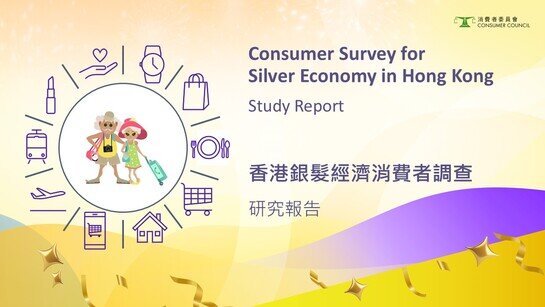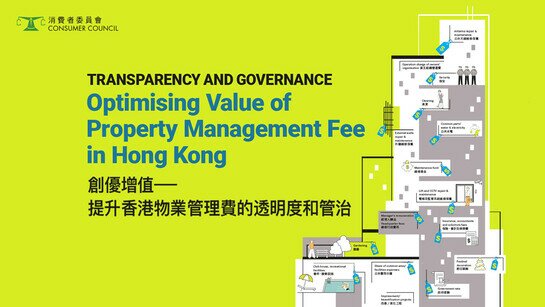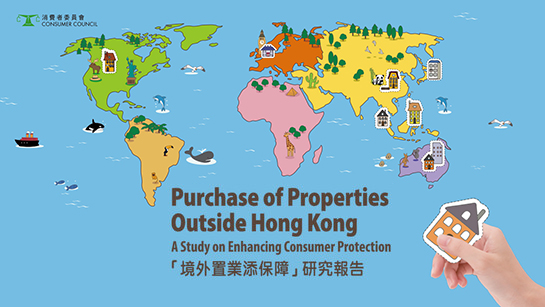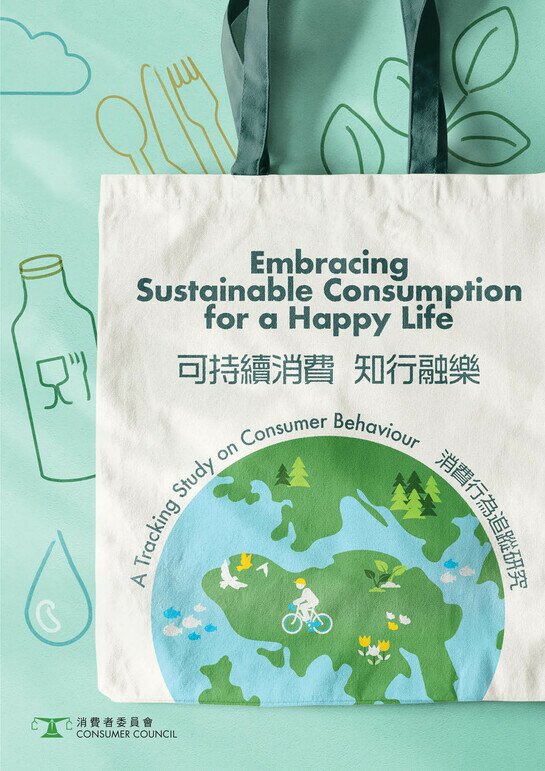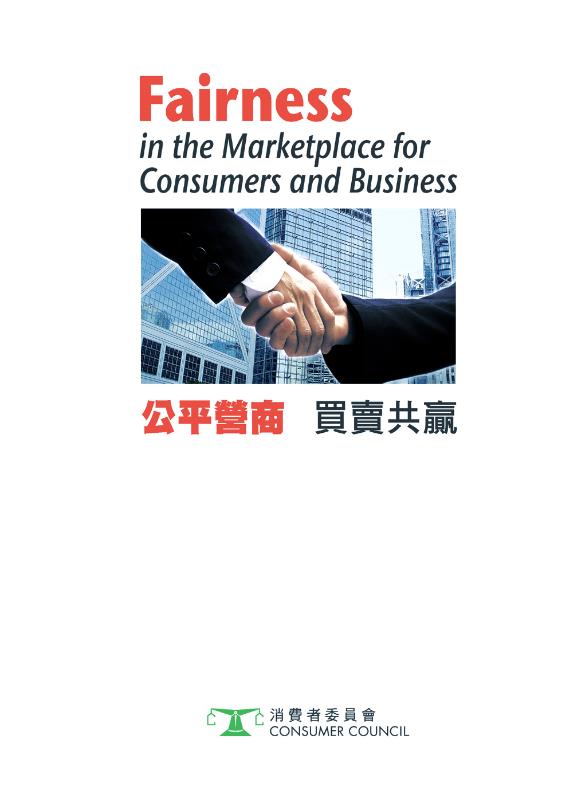
Introduction
- This Report examines the various laws and administrative procedures that currently serve the interests of Hong Kong consumers, and makes recommendations that the Council believes are critically important to upholding consumer rights. The Council's research, and its experience in working with consumers and businesses through its complaints handling and other services, indicates that there are deficiencies in the current consumer protection framework.
- Some of the areas that have come to attention are
- False or Misleading Descriptions of goods and services - Inducing consumers, by a false or misleading description, into purchasing goods or services that are not actually worth the price paid, or they are not what consumers want. Whilst the Trade Descriptions Ordinance ( "TDO") prohibits false trade descriptions, false marks and misstatements in trade or commerce, it only applies to goods and not services.
- Insufficient Information - The TDO only requires gold and platinum articles to be marked with prescribed information but there are no statutory information requirements for the supply of diamonds, natural Fei Cui (天然翡翠) and electronic products, which are commonly the subject of complaints.
- Misleading Advertisements - Dubious and exaggerated claims in advertisements are common causes of complaint, where consumers are led into error with their purchases.
- Aggressive or High Pressure Tactics - Harassment by salespersons is not an uncommon experience for consumers. S.6A of the Summary Offences Ordinance ( "SOO") covers harassment, however, it does not cover marketing activities at private places such as doorstep sales, inside a consumer's home or at private clubs.
- Bait and Switch - This concerns traders advertising goods at a bargain price without having reasonable quantities or amounts available to meet the demand that would be reasonably expected. This practice amounts to a 'con trick' where the advertised bargain is used as a bait to attract consumers into the store, with the intention of switching them to other more expensive products.
- Accepting Payment without Ability or Intention to Supply - Prepaid coupons or prepaid services schemes are a subject of complaint where traders fail to provide the prepaid goods or services, or to provide them within a reasonable time. The suspicion has been that there was either no intention to provide the goods or services into the foreseeable future, or that due regard was not given to the trader's ability to supply the prepaid goods or services.
- Adopting Unfair Terms in Standard Contracts - Unilateral variation clauses allowing traders to vary unilaterally, in any circumstances, the length of termination notices, the monthly fee payable, or the goods or services supplied under the contracts are typical examples of unfair terms causing consumer complaint.
- False or Misleading Descriptions of goods and services - Inducing consumers, by a false or misleading description, into purchasing goods or services that are not actually worth the price paid, or they are not what consumers want. Whilst the Trade Descriptions Ordinance ( "TDO") prohibits false trade descriptions, false marks and misstatements in trade or commerce, it only applies to goods and not services.
- The Council considers that the deficiencies of the existing legal framework in addressing the above unfair practices place Hong Kong's consumer protection efforts below the standards found in comparable advanced economies; and should therefore be addressed.
- A major concern is that despite the efforts of Government, the current framework not only fails to address longstanding unfair trade practices but also fails to keep up with rapid changes taking place in the market. As a result, consumers continue to suffer loss resulting from unfair trade practices. Moreover, the damage is not confined to Hong Kong's consumers. Allegations of retailing scams targeting Mainland tourists have resulted in significant public outcry against unfair sales tactics perpetrated on Hong Kong's visitors. The Council believes that urgent action needs to be taken so as not to exacerbate an emerging problem that can be harmful to Hong Kong's reputation as a tourist destination.
- The Council's primary recommendation to address the majority of issues is to create a comprehensive consumer protection law (the "Trade Practices Statute") administered by a public enforcement agency. This basic framework will provide general consumer safeguards against unfair marketplace conduct in the form of a basic 'safety net' that can adapt to the many situations that arise in a vibrant and creative economy. Industry self-regulation, and common law rights currently available to consumers would also continue to exist within the recommended framework.
A Comprehensive Trade Practices Statute
- The current legislative framework available to consumers for counteracting unfair trade practices is sector-specific and formulated in what could be described as a 'piecemeal' and 'uncoordinated' fashion. It therefore leaves gaps for unscrupulous practices to slip through the net. In particular, the uncoordinated nature of the various laws poses difficulties for consumers to understand the extent of their legal rights and for traders to comprehend the extent of their obligations to consumers.
- Moreover, enforcement of the existing laws by public agencies is typically through criminal sanctions, which are difficult to achieve. As a result, they are not often used, and in any event can be inappropriate as a mechanism for effecting overall change in marketplace behaviour. As far as aggrieved consumers are concerned, they are faced with the daunting task of taking civil action on their own as the only redress option; apart from seeking the assistance of the Council for mediation.
A Comprehensive General law and General Enforcement Agency
- The current mechanism lacks a variety of enforcement tools and redress options. This makes for less flexible enforcement at both private and public levels. Given the challenges posed by rapid changes in the marketplace, and the increasing complexity of sales tactics and business models, it is necessary, for the purpose of maintaining a fair marketplace, to establish a mechanism that is more flexible and inclusive in sanctioning unfair trade practices. The Council is of the view that in order to establish such a mechanism, a general and comprehensive Trade Practices Statute and a general enforcement agency should be introduced. In the interests of regulatory efficiency, this option is preferable to continuing with a piecemeal approach to addressing the broad range of consumer issues that arise in the economy.
- A number of questions arise as to how this new framework should operate.
What Practices should be Regulated?
- The Council considers that the practices to be regulated must be unfair in that they impinge on the basic consumer rights to safety; the right to be informed; and the right to choose. Essentially, these involve misleading or deceptive acts or omissions regarding matters essential for an informed decision; aggressive or high pressure sales practices that significantly impair or are likely to significantly impair a consumer's freedom of choice or conduct; and other improper or unfair trade practices by a trader that fall short of the general principle of good faith and honest market practice.
What Transactions should be Covered?
- The Statute is intended to offer comprehensive protection to consumers and set out uniform trading standards across industries. Therefore, the scope of the term 'product' should be wide-ranging to cover all manner of goods and services purchased by consumers, including simple low cost items to valuable items such as a car, private residential property, and contractual rights and obligations.
In what Context should the Law Apply?
- The context in which the law should apply in relation to an unfair practice must be one of business (a trader) to consumer. Therefore, the Statute shall only concern transactions between a provider (including the Government) of product in the course of business or trade and a consumer. It does not cover commercial transactions between two traders or private transactions between two consumers. Accordingly, the practice has to be performed by a person carrying on a business and engaged in trade or commerce before, during or after the transaction.
How should the Statutory Prohibitions be Formulated?
- Having regard to the manner in which other jurisdictions have constructed their general consumer protection laws, the Council considers that the best approach to creating prohibited conduct under the proposed Statute is to combine a general 'catch all' prohibition against unfair trade practices in trade or commerce, in addition to specific unfair conduct prohibitions. While there may be some uncertainty for both consumers and business as to whether acts not expressly prohibited under specific provisions, or not in a list of unfair practices, would nevertheless be considered as falling under the general catch-all provision, the Council believes that this uncertainty can be removed by proper guidelines issued by the relevant enforcement agency.
What is an Appropriate Enforcement Mechanism?
- The Council considers that an appropriate enforcement mechanism should seek the most cost-effective outcomes for the enforcement agency and be responsive to the needs of consumers for a swift resolution to their problem, while at the same time offering traders who find themselves at risk of a breach of law, an uncomplicated way to resolve the issue. The Council therefore recommends an enforcement approach that relies heavily on administrative measures, with backing of court sanction, to secure improvements in market place behaviour. The Council sees this approach as being measured in steps; as follows
- Attempting, as a first step, the reconciliation of disputes between traders and consumers.
- Accepting written, court enforceable, undertakings from traders who in the opinion of the agency have breached the law, to comply with a requirement not to engage in further 'at risk' conduct and if necessary to provide other redress.
- If acceptable undertakings are not given, carrying out a formal investigation and issuing court enforceable 'cease and comply' notices.
- Having the right to publicize the names of traders that the enforcement agency considers have infringed the Statute, and to whom it may have issued cease and comply notices, or from whom it has accepted undertakings.
- Where necessary, applying to the court for declarations, injunctions, orders and/or financial penalties, if an undertaking or a cease and comply notice has not been adhered to, or in any case if the agency considers the measures noted above have not, or will not achieve a desirable outcome.
- Alternatively, the enforcement agency may, as the urgency or situation of the matter requires, seek immediate court injunction without going through the processes of reconciliation and cease and comply notice.
- Attempting, as a first step, the reconciliation of disputes between traders and consumers.
- The trader concerned should be given reasonable opportunities to make representations at various stages (including investigation) and appeal against cease and comply notices or any part of a notice.
- The Statute should mainly provide for civil liabilities except for unfair practices that are so morally reprehensible or have caused so great a social harm, that criminal sanction is justified. Because the proposed Statute will be an unprecedented legislative framework for addressing unfair trade practices in Hong Kong, adjustments will be required in the course of implementation. If necessary, criminal offences can be created in the future for those unfair practices which regulation under the proposed Statute proves unsatisfactory. In addition, consumers should also be given a private right to sue for a contravention of the proposed Statute and to seek damages. In order to improve consumer access to legal redress, the Council also suggests that consideration should be given to a number of options. For example, establishing a Consumer Tribunal to consider matters under the proposed Statute and existing legislation that currently provides rights of private action regarding consumer transaction disputes. Consideration can also be given to expanding the scope of the Supplementary Legal Aid Scheme; or enhancing the availability of the Consumer Legal Action Fund to a wider range of consumers.
What Attributes should an Enforcement Agency have?
- Both the Consumer Council and the Customs and Excise Department have experience and resources currently devoted to addressing consumer protection matters. The C&ED in particular has vast experience in administering the criminal provisions of the Trade Descriptions Ordinance and the current resources devoted to that work could be adapted to the investigation role envisaged under the proposed Statute.
- Whether the Council should take on the role of enforcing the proposed Trade Practices Statute raises questions as to the appropriateness to do so, given the Council's role as a strident advocate for consumers, and its functions in product research and testing, and selling that information in the marketplace. On the other hand, it has the resources and expertise to take on the function.
- However, as the author of this Report, the Council believes that in order to avoid criticisms of conflict of interests, and perceptions of bias, one way or the other, that may arise from any recommendations regarding the role of the Council under the proposed Statute, that the matter is best left open for further public deliberation.
How should the Proposed Statute fit within the Existing Legislative Framework?
- Much of the existing statutes that cover consumer protection, such as provisions in the Banking Ordinance and the Telecommunications Ordinance, address important sector-specific issues, and the relevant agencies have the expertise and resources to administer the law.
- Accordingly, the Council is of the view that trade practices provisions in existing statutes regulating specific sectors should remain unaffected by the enactment of the proposed Statute, provided that a significant degree of professional and specialized knowledge is required for enforcement of such provisions or statutes, and a similar level of protection has already been provided by such statutory frameworks, parallel to and compatible with the proposed Statute. If necessary, amendments should be introduced to these existing statutes to ensure that they will cover the range of unfair trade practices that the proposed Statute will regulate. Further, consideration may also be given to whether it is necessary for the relevant agencies to submit a report, when reasonably required by the Government, on their regulatory consumer protection work for public scrutiny.
- With regard to the existing self-regulatory regimes of professional bodies, the Council considers it is more appropriate for the trade practices of members of these bodies to continue being regulated by their respective rules and procedures because enforcement requires specific professional expertise or knowledge that the new enforcement agency under the proposed Statute would not have. "Professional bodies", for the purpose of the proposed Statute should mean a well-recognised and established organization (not being a general trade association) the practice of which requires distinctive skills and knowledge and which has an effective self-regulatory mechanism closely monitoring the trade practices of its members and providing easy access to consumers' complaints, and adequate sanctions for breaches of rules. The Council suggests that a referral system should be established between the new enforcement agency and the professional bodies so that complaints filed with the new enforcement agency against professionals will be duly and speedily referred to the bodies concerned. Moreover, in drafting the Statute, the Government may consider supplementing the relevant provisions of the proposed Statute by a list of professional bodies.
- Although the application of false or misleading trade descriptions on goods regulated by the TDO will fall within the ambit of the proposed Statute, given that the TDO and proposed Statute are different in terms of scope, objective and enforcement as mentioned, the Council is of the view that the trade descriptions provisions and their enforcement under the TDO should remain unaffected by the enactment of the proposed Statute.
The Need for Guidelines
- There are some specific trade practices issues that are of serious social concern and which the Council considers need either further or more detailed regulation through subsidiary legislation, and/or guidance to clarify how certain matters will be dealt with by the agency enforcing the prohibitions under the proposed Statute. Of particular concern are misleading and deceptive advertising, and false representations as to price. The Council is of the view that in principle, the regulation of these specific issues should be first addressed by guidelines that promote compliance with the general prohibitions in the proposed Statute. The Council suggests that the guidelines can be drafted with reference to those guidelines currently administered by the Telecommunications Authority and the Broadcasting Authority. If compliance is subsequently considered to be unsatisfactory, formal control may need to be imposed by setting out specific rules, with legal force in the form of subsidiary legislation.
- The Council is also concerned that in some cases, misleading or deceptive advertising claims may induce consumers into improper self-medication and thereby delay proper treatment. This is clearly a public health matter that needs to be addressed under the Undesirable Medical Advertisements Ordinance (Cap. 231). Since improvement of the Ordinance is primarily a public health issue, it is outside the ambit of this study. The Council will propose amendments in a separate submission to the Government.
Proposed Improvements for Current Legislative and Regulatory Frameworks
- Notwithstanding the introduction of the proposed Statute, the Council considers that improvements are necessary to the existing consumer protection statutes that will run in parallel with the new framework, and to some areas that are currently subject to industry licensing. Accordingly, the Council has examined issues regarding relevant sectors that fall into this category, and makes the following recommendations.
Measures necessary to Rectify Deficiencies in the Trade Descriptions Ordinance
- A number of amendments have been put forward by a Government Working Group, of which the Council has been an active member, examining the need for amendments to this Ordinance, such as:
- prohibitions against misrepresentations as to price;
- expanding the definition of "trade description" to cover "warranty and availability of after-sale repair and maintenance services";
- imposing obligations on traders of regulated electronic products to state in invoices or receipts any representation relating to the availability of after-sale repair and maintenance services;
- adding a provision prohibiting false or misleading representation in the course of trade, business or profession, for the sale of goods, as regards seller's connection with another person; and
- introducing a definition regulation on natural Fei Cui (天然翡翠), diamonds, gold alloy and platinum to set out clearly the conditions for the use of these terms, and information standards regarding certain electronic products.
- prohibitions against misrepresentations as to price;
- The Council supports the amendments proposed under the TDO Amendment Bill and the Proposed Subsidiary Amendments. The Council hopes these (comparatively) simple and straightforward amendments will soon be approved and implemented as an expeditious and practical tool to address the deficiencies and the unfair trade practice issues not presently covered. In addition, the Council has identified a potential problem regarding uncertainty with the timing of trade descriptions in sales receipts, and whether putting information on sales receipts comes within the meaning of applying trade descriptions in the course of trade or business under the TDO. The Council has therefore recommended that appropriate amendment(s) should be made to make it clear that trade descriptions contained in sales receipts are covered, to remove any uncertainty in the legal application of the provisions.
Measures Regulating Unfair Terms in Standard Consumer Contracts
- Given the rapid growth of the service economy and proliferation in the use of standard form consumer contracts, the Council has found that the rights and interests of consumers have been seriously jeopardized by the inclusion of unfair terms in these types of contracts. As such, it considers that more stringent regulation of traders' activities in this area is considered necessary. This is notwithstanding the existence of the proposed Statute that will regulate unconscionable conduct, in order to secure fair and basic protection for consumers. Such protection is particularly important where unfair terms are widely adopted by all major traders in a sector and as a result, consumers (who invariably lack bargaining power) find they have no choice but to accept the terms in order to obtain the services needed.
- The Council recommends that legislation should be introduced to regulate unfair terms in standard consumer contracts (i.e. those contracts not individually negotiated). The legislation may be modeled upon the UK Unfair Terms Regulations, with an indicative and non-exhaustive list of potential unfair terms. The list can be constructed with reference to the UK Unfair Terms List, but should also take into account the differences in culture and marketplace between Hong Kong and the UK. The enforcement agency under the proposed Trade Practices Statute should also be responsible for administering, monitoring compliance of and enforcing this legislation.
Improvement in the Regulation of Unfair Practices in the Telecommunications and Broadcasting Industries
- The Council and the relevant sector regulators, the Telecommunications Authority ("TA") and the Broadcasting Authority ("BA") are concerned with the prevalence of unfair sales tactics involving aggressive, harassing and deceptive practices being perpetrated on consumers by sales people in the relevant sectors. The legislative framework for both sectors is currently not adequate to deal with all the problems that are emerging and some efforts need to be made to increase the powers of the TA and BA to address the consumer distress that is occurring.
- The distinction between telecommunications and broadcasting sectors is rapidly diminishing, and this is recognised through Government proposals to establish a unified regulatory framework for both sectors through new legislation and the creation of a Communications Authority. The Council supports the Government's initiatives, and sees the new framework, working in parallel with the proposed Trade Practices Statute, as an opportunity to address many of the deficiencies in consumer protection that currently exist in Hong Kong. However, the new legislation will take time to come to fruition, and there is a need for urgent action to stop the problems that are occurring. Accordingly, the Council is proposing a number of short term measures to address the problems that currently exist.
- With regard to telecommunications, the Council recommends the expansion of s.7M of the Telecommunications Ordinance ("TO") to include any unconscionable or improper conduct in providing or acquiring telecommunications networks, systems, installations, customer equipment or services including (but not limited to) promoting, marketing or advertising the network, system, installation, customer equipment or service.
- The Council further believes that in view of the fact that enforcement of the telecommunications sector will not come under the proposed Trade Practices Statute, it is important to ensure that the protection conferred by the TO on consumers against unfair trade practices will not be less than that of the proposed Trade Practices Statute. As such, the Council also recommends that s.7M should be further amended to the effect that it expressly covers all unfair trade practices as prohibited under the proposed Trade Practices Statute, before, during and after transaction, and that it covers the conduct of the licensees and their agents or servants.
- With regard to the broadcasting sector, the BA is not specifically empowered by the Broadcasting Ordinance ("BO") and the Broadcasting Authority Ordinance to deal with trade practices issues. Nevertheless, formal control over unfair trade practices for broadcast services can be facilitated by statutory and/or licence condition amendments within the established co-regulatory framework. Any problems in the existing framework can therefore be addressed through introducing certain changes to the law and to administrative procedure, thereby providing an expedient solution. The Council is therefore recommending that because of the immediate need for a solution to the prevalence of unfair sales tactics noted above, the Government should consider either exercising its power in the public interest or seeking the consent of the individual licensees under existing licences to add a new licence condition:-
- to prohibit unfair trade practices, before, during and after transactions, by the licensee or its agents or servants; or
- to require the licensee, after consultation with the BA, to prepare a code of best sales practices prohibiting unfair trade practices, before, during and after transactions, by the licensee or its agents or servants.
- to prohibit unfair trade practices, before, during and after transactions, by the licensee or its agents or servants; or
- The Council does not consider that the prospective establishment of the Communications Authority, and future unified legislation, should inhibit the proposed improvements to the TO and BO, as noted above. For example, an improved s.7M as proposed may be easily transposed into the new unified legislation, covering the conduct of both telecommunications and broadcasting licensees. Constructing a revised provision to cover the complete range of unfair sales tactics and misleading or deceptive conduct, at this stage, would not be redundant but merely early drafting of a provision that would need to be included in the powers of the Communications Authority.
Conclusion
- The Council believes that the combination of various existing and future proposed safeguards outlined in its Report, and recommendations, will produce a synergy where the actions of separate agencies and laws working with the proposed Trade Practices Statute, and its public enforcement agency, will together have greater total effect on consumer protection than would otherwise be available.
- This approach will serve the interests of not only consumers but also those of business, for the ultimate well being of the Hong Kong economy and overall community of interests.







